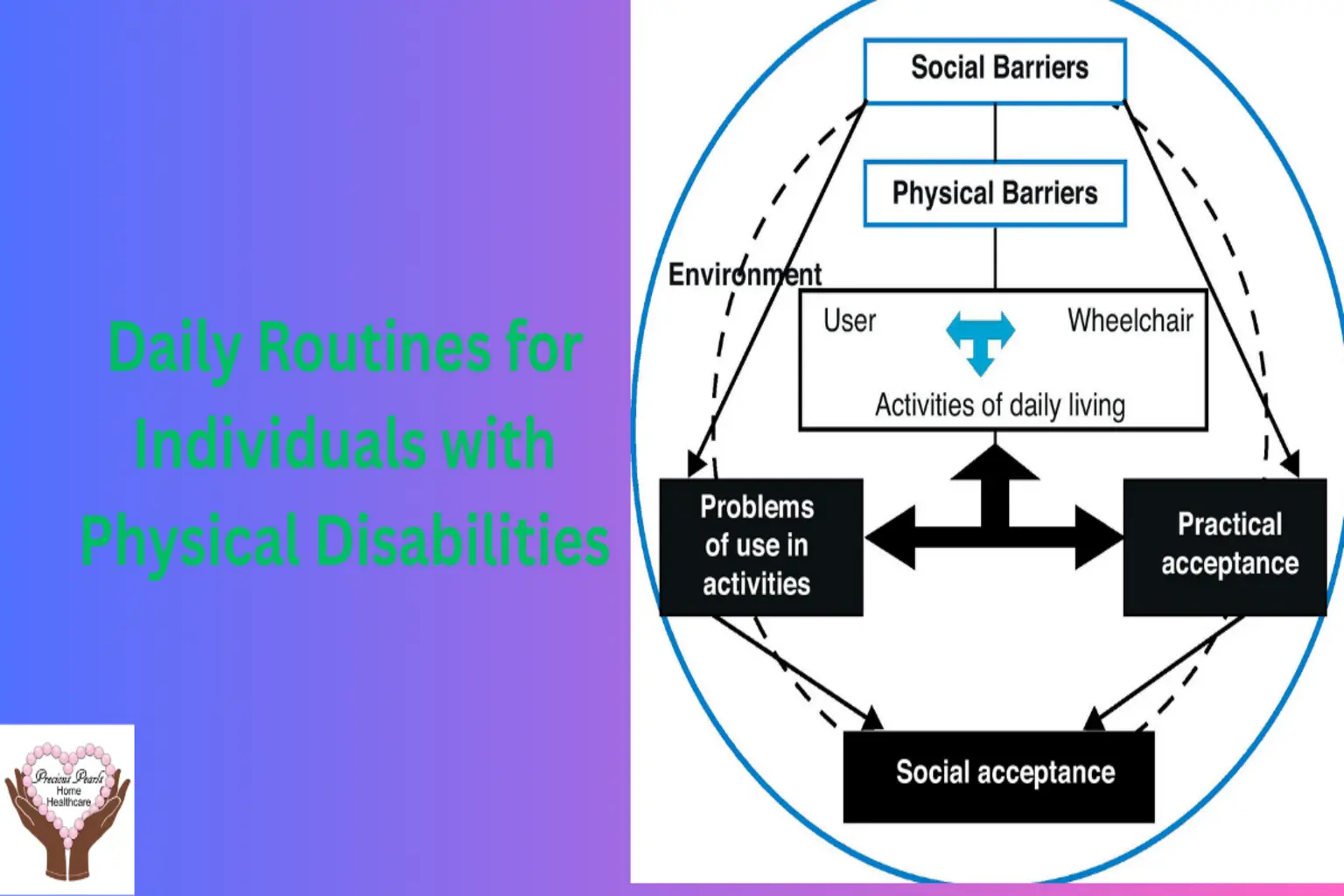Although having a physical disability can present special difficulties in day-to-day living it does not imply that productivity and independence are unattainable. Generally speaking any condition that restricts a persons ability to move function physically or maintain endurance is considered a physical disability. Paralysis muscular disorders limb loss or chronic illnesses that impair movement are examples of this. Setting up a daily routine for physical disabilities is more than just scheduling for people navigating these realities its an essential tactic for fostering safety health and a sense of normalcy.
When days are unpredictable or physically taxing structured routines can help with time management stress reduction and self-reliance. This blog aims to support independent living and the development of adaptive habits that meet the various needs of individuals with physical disabilities by offering useful flexible routine ideas.
Why Daily Routines Matter
Everybody has benefited from having a regular daily schedule but people with disabilities benefit the most. The reason is as follows:
Promotes Independence and Control
Organizing and predicting tasks makes them easier to handle. A well-organized day can provide a strong sense of autonomy for people with restricted mobility. People can manage each aspect of the day more effectively and on their own terms if they are aware of what has to be done and when.
Supports Physical and Mental Health
Regularity promotes healthful habits like exercise good nutrition and personal hygiene. Additionally it promotes social interaction and regular rest both of which are essential for emotional equilibrium and physical recuperation. Routines can reduce mental stress and anxiety in people with disabilities by substituting consistency for uncertainty.
Improves Time Management and Productivity
A deliberate routine enables people to allocate their energy effectively. It prevents burnout lessens decision fatigue and makes sure that important things like therapy or medication arent forgotten.
Structured Routines for Independent Living with Physical Disabilities
Customization is crucial regardless of whether youre creating a new routine from the ground up or making changes to an existing one. Your routine should complement your skills rather than undermine them. With ideas you can modify to suit your needs lets divide the day into manageable chunks.
Morning Routine Tips
The tone of the rest of the day is frequently established in the morning. A calm well-prepared beginning can have a significant impact.
Start with Adaptive Wake-Up Practices
Theres no reason why getting out of bed should be difficult. Start your day with the resources that will facilitate the process:
- Voice-activated tech: With smart speakers or apps you can read out your schedule turn on lights and play music.
- Assistive devices: The safe transition from sleep to sitting or standing can be facilitated by assistive devices such as electric adjustable beds transfer poles or bed rails.
- Allow extra time: To save energy and go at your own pace start your day a little earlier.
Personal Hygiene & Grooming
It’s crucial to maintain hygiene but when mobility is restricted adjustments must be made. Consider following tools:
- Handle grips on electric toothbrushes.
- Slip-resistant mats and shower chairs.
- Long-handled brushes and combs.
Grooming can be made more convenient with grab bars a roll-under sink or even an all-in-one station close to the bed.
Healthy Breakfast Options
Nutrition is particularly crucial if you have limited physical activity or are managing chronic conditions.
- Advice on meal preparation: Smoothies should be pre-portioned and kept in reachable quantities. Make use of kitchen tools that are adaptable such as ergonomic utensils or easy-open containers.
- Simple meals: Protein can be obtained with little preparation or cleanup by using boiled eggs Greek yogurt with fruit or overnight oats.
Midday Routines for Productivity and Engagement
Whether you are working going to therapy or just taking part in a hobby midday is the best time of day to accomplish your goals.
Managing Work or Hobbies
Maintaining mental engagement and stimulation is equally as crucial as maintaining physical health.
- Work-from-home tools: Voice-to-text software for writing or sending emails. Magnifiers or screen readers for people who are blind or visually impaired. Desks or lap tables with adjustments for comfortable placement.
- Hobbies to try: Digital art or sitting painting. Journaling, blogging or writing. Online communities for gaming or book clubs. Having a midday anchor, such as work or a hobby gives you purpose and happiness but you don’t have to be productive every hour.
Physical Activity or Therapy
Even modest movement is essential for preserving circulation strength and flexibility.
- At-home routines: Gentle stretches or yoga while seated. Exercises using resistance bands for the arms and legs. Sessions of video therapy under guidance.
- Staying consistent: Arrange therapy as though it were an appointment. To remind yourself use tracking apps or phone alarms. Progress rather than perfection should be the goal of physical routines. The better the results the more consistently you move.
Social Interaction & Mental Wellness
While isolation is a serious issue, maintaining relationships can help people feel less alone and happier.
- Ways to connect: Plan video chats with your loved ones. Establish frequent check-ins or chat dates.
- Online support: Participate in groups for people with comparable conditions. Engage in advocacy forums interest groups or online courses. Even a small amount of daily interaction can boost your mood and create a sense of community.
Evening Routine for Relaxation and Rest
Your body and mind will be more ready for restorative sleep if you wind down properly.
Preparing for Wind-Down
Establishing a calm atmosphere is essential.
- Light and temperature control: Use voice-activated lighting blackout curtains or dimmable bulbs. Use a fan or modify the thermostat for comfort.
- Mental relaxation: Listen to audiobooks or soothing music. For anxiety reduction try guided meditation or easy breathing techniques. To give your body enough time to adjust begin the wind-down at least an hour before bed.
Accessible Dinner Prep
It’s not necessary to have elaborate evening meals to be nourishing and filling.
- Adaptive tools: Single-handed cutting boards. Pans with an easy grip or jar openers.
- Cooking tips: Reduce the amount of handling by using air fryers or slow cookers. To cut down on daily prep, batch-cook meals. Take into consideration a nutritious meal delivery service that satisfies dietary requirements if cooking is too challenging.
Bedtime Hygiene & Sleep Support
Take a comfortable and safe way to end your day.
- Nighttime hygiene: Employ accessible bathroom designs that feature grab bars and raised toilet seats. In case you need, it keep a urinal or commode close by.
- Sleep aids: Try pressure-relieving mattresses or orthopedic pillows. Adjustable beds can be used to raise the torso or legs according to your needs. You can sleep better and wake up feeling rejuvenated if your bedtime routine is easy.
Tools and Technologies That Help Build Routines
Technology has come a long way in making routines more accessible. Here are some favorites:
Apps:
- Medisafe for reminders about medications.
- For task management use Trello or Todoist.
- A sleep cycle to track the quality of your sleep.
Smart home tools:
- Voice assistants for device control such as Google Home or Alexa.
- Comfortable lighting systems or smart thermostats.
Safety tech:
- Fall detection-equipped medical alert systems.
- GPS-enabled gadgets or wearable emergency buttons.
- These tools encourage self-reliance and lower the chance of accidents in addition to saving time.
Conclusion
A well-planned well-executed daily routine is a means to a better quality of life for people with physical disabilities not just a tool for increasing productivity. Tasks become more manageable and empowering when they are organized properly. Routines support health objectives lessen anxiety and give one a sense of accomplishment every day. Never forget that its acceptable to try new things. Try a variety of instruments timings and methods until you discover a rhythm that suits you the best. There is no one-size-fits-all strategy your routine should be a source of support rather than anxiety.
Our mission at Precious Pearls Health Home Care is to support people in leading more comfortable and independent lives. We are here to help you at every stage whether you need assistance creating a routine handling everyday responsibilities or obtaining home care services. Let us establish a routine that will enhance your day. Reach out to Precious Pearls Health Home Care right now.
FAQs
Start by determining two to three daily tasks that you can handle. To finish them without stress use assistive technology and give yourself more time.
A strong sense of purpose and stability can be obtained through regular routines which can also boost motivation and reduce anxiety.
Monitor your development acknowledge even minor accomplishments and dont be afraid to change the routine if something isn’t working for yo






